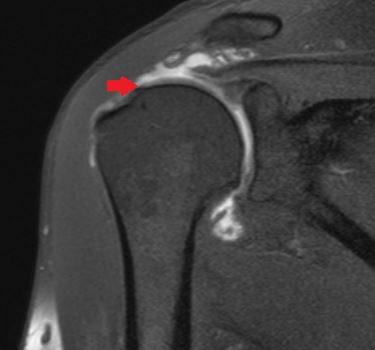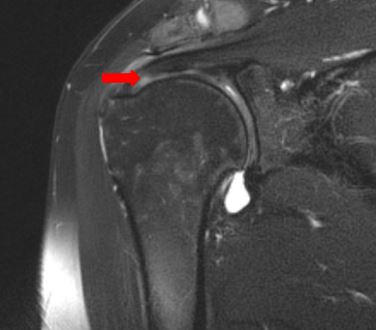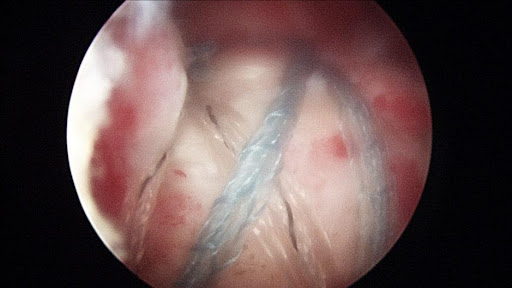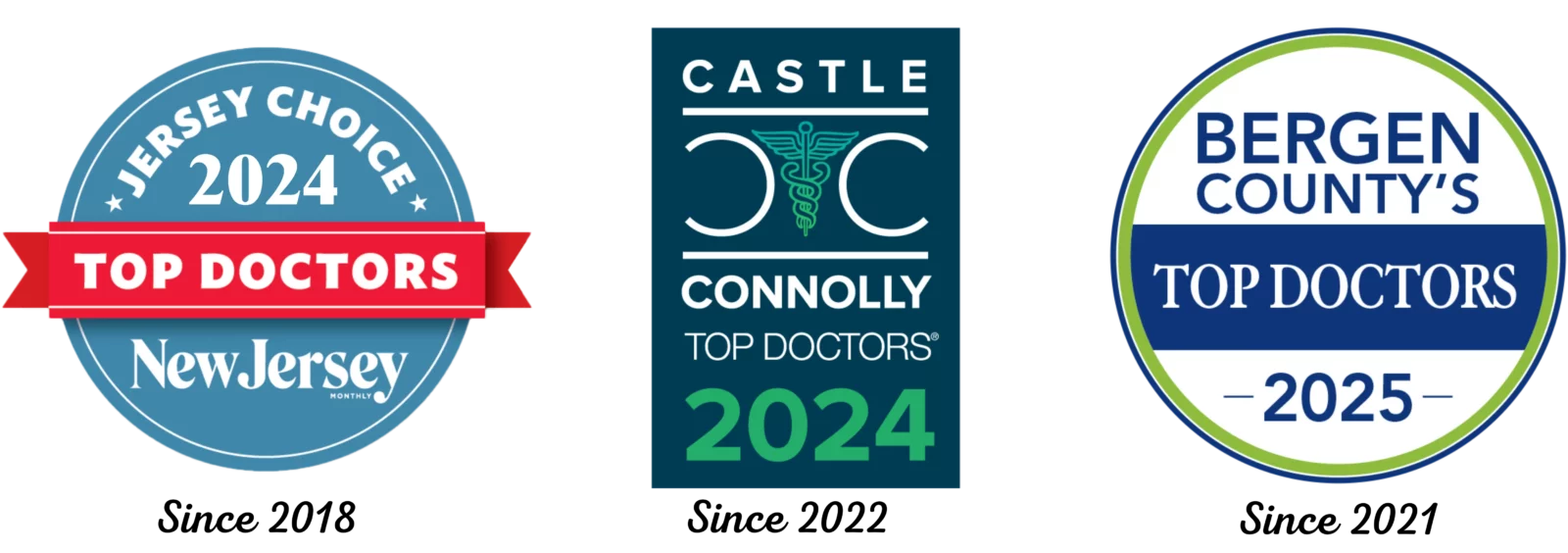Rotator Cuff Repair New Jersey
The Shoulder Center
at Modern Orthopedics of New Jersey
Paramus
72 Route 17 North
Paramus, NJ 07652
Wayne
2025 Hamburg Turnpike
STE C, Wayne, NJ 07470
Parsippany
3799 US-46
#207, Parsippany, NJ 07054
Understanding Rotator Cuff Repair
Rotator cuff tears may develop because of an acute injury, but most rotator cuff tears are caused by age-related degeneration or chronic impingement (rotator cuff tendons being pulled and squeezed under the coracoacromial arch). The rotator cuff consists of four muscles that hold your shoulder joint in place and help you lift and rotate your upper arm. When a rotator cuff “tears”, it can involve partial or full-thickness tears. In full-thickness tears, one or more of the tendons may detach from the humerus (upper part of the shoulder).

Torn Rotator Cuff on MRI

Intact Rotator Cuff on MRI
Arthroscopic Rotator Cuff Repair
Shoulder arthroscopy involves introducing a small camera and instruments into the shoulder joint to examine different parts of the shoulder. This may oftentimes be both therapeutic and diagnostic. Arthroscopy allows the surgeon to visualize the labrum, biceps tendon, capsular ligaments, undersurface and superior surface of rotator cuff, the glenoid, humeral head, and subacromial space. Debridement and repair of injured structures can be done when necessary through the small portals made in the shoulder. The overall goal is to restore normal function and stability while eliminating pain.
Rotator cuff repairs involve returning the torn tendon to its native location with the use of anchors placed in the bone and sutures drawn through the torn end on the tendon. The tendon will take about 6 weeks to heal down to the bone and not until 3 months after surgery is it safe to do any kind of resistance or strengthening of the shoulder. Physical therapy for range of motion will begin 6 weeks after surgery and you can expect the entire recovery process to take anywhere from 6 months to 1 year after surgery.
Common causes of rotator cuff tears include:
-
Repetitive overhead motions (e.g., tennis, painting)
-
Normal wear and tear over time
-
Sudden injuries (e.g., falling on an outstretched arm)
-
Lifting heavy objects
-
Shoulder dislocation
Bone spurs can also contribute to the risk of a degenerative rotator cuff tear and shoulder impingement.
Symptoms of a rotator cuff tear may include:
-
Dull ache in the shoulder, often worse at night
-
Shoulder pain that increases with arm movement
-
Pain along the outside of the shoulder and upper arm
-
Weakness in the arm
-
Popping or cracking sensation when moving the arm
-
Difficulty with overhead activities
Cuff tears can be diagnosed clinically, but MRI is used to determine the extent of the tear and guide further management, especially in cases of a torn rotator cuff. X-rays and ultrasound may also be used to assess the shoulder and rule out other conditions.

Treatment Options
Partial thickness tears, also known as a partial tear, are initially treated with conservative management including:
-
Physical therapy
-
NSAIDs (Non-Steroidal Anti-Inflammatory Drugs)
-
Activity modification
-
Possible corticosteroid injections
Conservative approaches for rotator cuff tears treated include rest, immobilization, ice, anti-inflammatory medication, physical therapy, and cortisone injections.
If a patient does not respond to conservative management or has a full-thickness tear causing significant pain and disability, they may be a candidate for arthroscopic repair of the rotator cuff, a common method for a rotator cuff tear treated.
Arthroscopic Rotator Cuff Repair
Shoulder arthroscopy involves introducing a small camera and instruments into the shoulder joint to examine different parts of the shoulder. This procedure is often both therapeutic and diagnostic. Arthroscopy is a minimally invasive procedure often used to treat various rotator cuff injuries.
Arthroscopy allows the surgeon to visualize:
-
The labrum
-
Biceps tendon
-
Capsular ligaments
-
Undersurface and superior surface of the rotator cuff
-
The glenoid
-
Humeral head
-
Subacromial space
The rotator cuff muscles and tendons are connected to the shoulder blade, playing a crucial role in arm movement and stability.
Debridement and repair of injured structures can be done when necessary through small portals made in the shoulder. The overall goal is to restore normal function and stability while eliminating pain.
Rotator cuff repairs involve returning the torn tendon to its native location using anchors placed in the bone and sutures drawn through the torn end of the tendon.
Recovery Process
-
The tendon will take about 6 weeks to heal down to the bone.
-
Physical therapy for range of motion will begin 6 weeks after surgery.
-
Resistance or strengthening exercises are typically safe to begin 3 months after surgery.
-
The entire recovery process can take anywhere from 6 months to 1 year after surgery.
A Different Orthopedic Experience for Shoulder Pain
At Modern Orthopedics of New Jersey, we offer a unique approach to rotator cuff repair. Our experienced team specializes in the arthroscopic repair of torn rotator cuffs, ensuring minimal invasiveness and optimal outcomes. We prioritize personalized care, guiding you through every step of the diagnosis, treatment, and recovery process for a torn rotator cuff. Our goal is not just to repair your rotator cuff, but to restore your quality of life and help you return to the activities you love.
Arthroscopic rotator cuff repair


A Different Orthopedic Experience.
We combine cutting-edge technology with personalized care to deliver exceptional orthopedic treatment. Our team of experts focuses on your unique needs to ensure optimal outcomes and a superior healing experience.
Our Approach to Care
Comprehensive solutions for your orthopedic needs
Treatment Diversity
We offer a comprehensive range of treatments, ensuring personalized, targeted plans for every patient.
Technological Excellence
We utilize cutting-edge technology for precise diagnosis and innovative treatment options.
Collaborative Care
Our multi-disciplinary approach involves various specialties to provide comprehensive care and recovery.
Skilled Experts
Our team is composed of highly skilled, experienced orthopedic professionals, providing expert care.
Patient Focus
We prioritize patient comfort and satisfaction, creating a supportive environment for optimal healing.
Post-Treatment Support
Our robust post-treatment support ensures ongoing patient care through recovery and rehabilitation services.